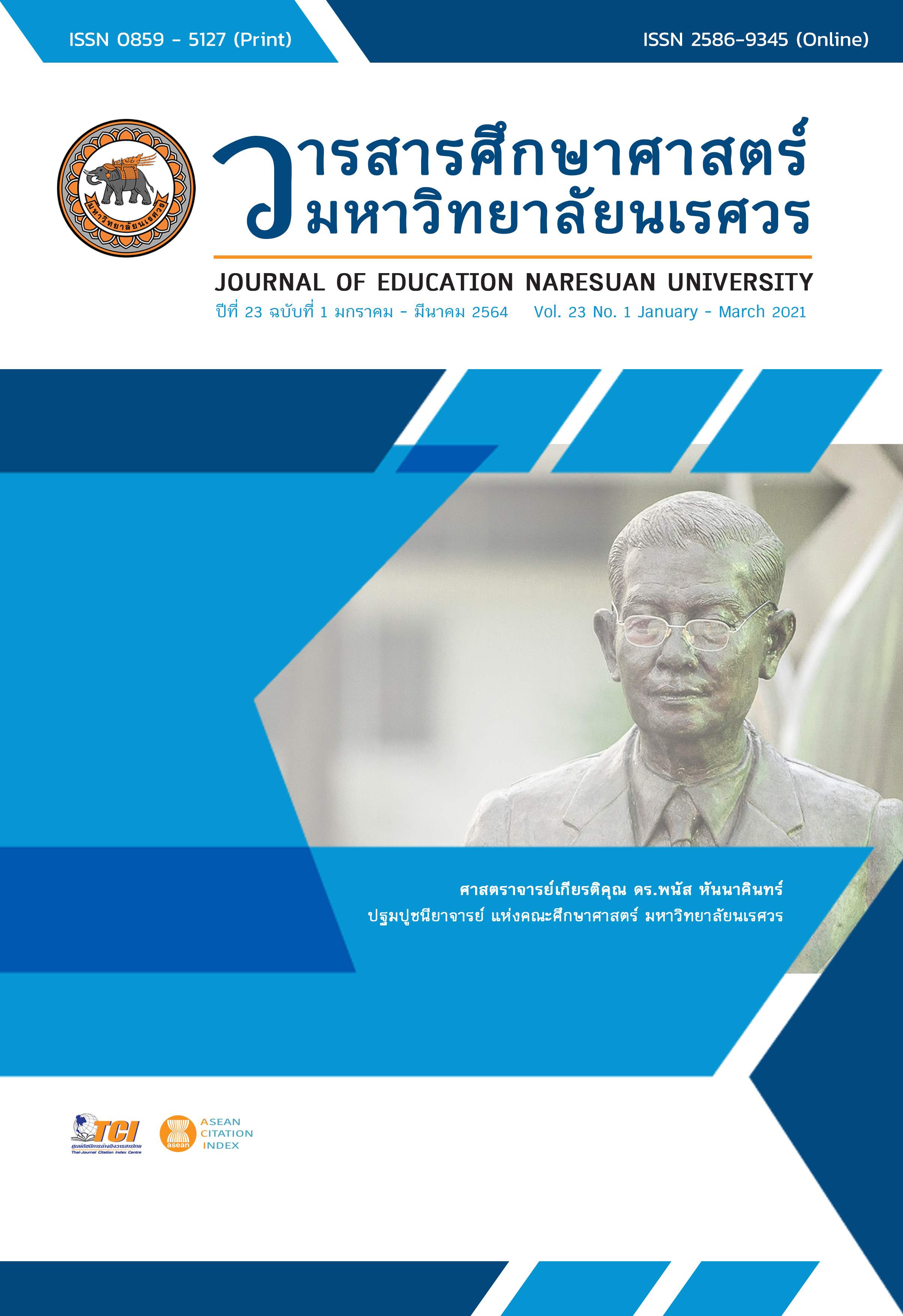A MODEL OF DEVELOPING LEARNING MANAGEMENT COMPETENCY FOR SECONDARY EDUCATION TEACHERS TOWARDS THAILAND 4.0 ERA
Main Article Content
Abstract
This Research and Development (R&D) was divided into three phases: regarding the investigating of the conditions, problems, and factors concerning developing learning management competency for secondary education teachers, informants were 327 school personnel, instrument used was a questionnaire, and data were analyzed by frequency, percentage, mean, and standard deviation; the creation of a model of developing learning management competency for secondary education teachers, participants were
15 experts, instruments used were connoisseurship and a model verification form, data were analyzed by mean, standard deviation and summarizing; and the result studying of implementing the model of developing learning management competency for secondary education teachers, respondents were
15 teachers, instruments used were an evaluation form and focus group discussion, data were analyzed by mean, standard deviation, and summarizing in topics and issues. The results revealed as follows: 1) the conditions were at the lowest level, problems were at the highest level, and factors were overall at a high level, 2) the model of developing learning management competency for secondary education teachers composed of 6 components and results of model verification were at the highest level both accuracy and suitability, and 3) The results of implementing the model of developing learning management competency was found that all teachers who had competencies at a high level both knowledge and process skills, the satisfaction was discussed in 9 topics, and they discussed concerning reflective thinking in 3 issues.
Article Details
The owner of the article does not copy or violate any of its copyright. If any copyright infringement occurs or prosecution, in any case, the Editorial Board is not involved in all the rights to the owner of the article to be performed.
References
Ananiadou, K., & Claro, M. (2009). 21st century skills and competences for new millennium learners in OECD Countries. OECD Education Working Papers, No. 41. Paris: OECD Publishing.
Chamchantharawong, C., Chanjarain, I., Suwanjinda, C., & Siririrth, W. (2017). Factors affecting the functional competency of teacher of graduate diploma students in teaching profession at Chiangrai College. Veridian E-Journal, Silpakorn University, 10(1), 269-280.
Eisner, E. W. (1976). Educational connoisseurship and criticism: Their form and functions in educational evaluation. Journal of Aesthetic Education, 10(3/4), 135-150.
Hanwong, U. (2017). Activity arrangement enhancing teachers’ professional competency. FEU Academic Review, 8(1), 104-120.
Jareonsettasin, T. (2017). Education Reform and Entrance 4.0. Retrieved from http://www.en.moe.go.th/enMoe2017/index.php/news/8-education-reform-entrance-4-0
Jaroensettasin, T. (2016). Six major issues of educational reform strategies. Retrieved from http://www.moe.go.th/moe/th/news/detail.php?NewsID=45271& Key=infographics
Junnoi, P. (2017). From Pooyailee to education. Retrieved from https://www.thailife.de/newsreader-ausbildung/chakphaihyl-thngkarsksaaithy-4-0-ody-dr-ophym-chnthrnoi.html
Kittisuwannakul, T., Wangsrikoon, A., & Sutthirat, C. (2017). The needs of competency for primary private school teachers. Humanities and Social Sciences Journal of Graduate School, Pibulsongkram Rajabhat University, 11(2), 48-57.
Klayluck, P., Chanbanchong, C., Pakdeewong, P., & Konpong, A. (2013). A model of teamwork competency development for educational personnel working in the Office of Primary Education Service Areas. Journal of Education Naresuan University, 15(5), 136-145.
Maotuak, S., Srisuk, K., Intanate, N., & Hanwong, U. (2015). The use of reflective thinking to develop the science teachers’ competency in the instruction to promote students’ scientific literacy. Journal of Liberal Arts, Maejo University, 3(1), 13-36.
National Institute for Development of Teachers, Faculty Staff and Educational Personnel (NIDTEP). (2000). Evaluation for teacher development. Retrieved from http://www.moe.go.th/moe/th/news/detail.php?NewsID=18528&Key=news_research
Nuanyaem, T., Kamson, S., & Suttirat, C. (2017). The development of teachers workshop through the quality cycle on the reading literacy scale model for teachers under the Office of the Basic Education Commission. Humanities and Social Sciences Journal of Graduate School, Pibulsongkram Rajabhat University, 11(2), 70-83.
Office of the Basic Education Commission. (2010). Manual of teachers’ competency evaluation, Office of the Basic Education Commission B.E. 2553 (2010). Retrieved from http://www.tmk.ac.th/teacher/capasity.pdf
Office of the Basic Education Commission. (2008). Training and development manual for new trend of school administrators. Retrieved from http://social.obec.go.th/library/document/asean/ภาคผนวกคู่มือผู้บริหาร.pdf
Office of the Education Council. (2017). Education in Thailand. Bangkok: OEC Publication.
Office of the Teacher Civil Service and Educational Personnel Commission (OTEPC). (2007). Determination of working hours and evaluation of outcomes from working on duties. Retrieved from
https://www.otepc.go.th/images/document/2560/601010-0635.pdf
Onnuam, W., Junsira, V., Mejang, S., & Parnichparinchai, T. (2016). A developmental model for enhancing primary teachers’ competencies under the Offices of Primary Educational Areas. Journal of Education Naresuan University, 18(3), 292-302.
Parnichparinchai, T. (2017). The learning management competency for 21st century of student teachers in educational project for the development of teachers at the wilderness on the Thai-Myanmar border area, Tak province. Journal of Education Naresuan University, 19(4), 123-132.
Phonakorn, C. (2016). Thai education towards Thailand 4.0. Retrieved from http://km.li.mahidol.ac.th/thai-studies-in-thailand4.0
Prasertphon, C., Kornpuang, A., Jansila, V., & Chatruprachewin, C. (2013). A model for developing learning management competency of new teachers at general education private schools. Journal of Education Naresuan University, 15(5), 136-145.
Secretariat Office of the Teachers Council of Thailand. (2013). Teachers council rules regarding professional standards, B.E. 2556. Retrieved from http://www.educ.su.ac.th/images/curriculum/ข้อบังคับครุสภา_56.pdf
Sinlarat, P. (2017). Thai education 4.0 is more than education. Retrieved from http://www.bsru.ac.th/identity/archives/2570
Somprach, K., Popoonsak, P., & Maneewong, S. (2012). Teacher development program to enhance learning competency for small primary schools in Thailand. Procedia – Social and Behavioral Sciences, 69, 1052–1058.
Teachers’ Council of Thailand. (2018). Southeast Asia Teachers Competency Framework (SEA-TCF).
Retrieved from http://site.ksp.or.th/download-file.php?Action=filedownload&DataID=3462
Thipkrongtham, O., Prapa, T., & Reangsri, S. (2017). Factors affecting learning organization in the 21st century for Benjaburapha Subarea Teachers under the Jurisdiction of the Secondary Educational Service Area Office 2. Narkbhutparitat Journal Nakhon Si Thammarat Rajabhat University, 9(1), 97-108.


